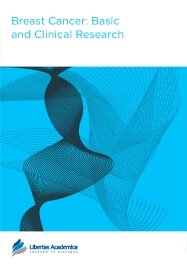

Publication Date: 07 May 2010
Type: Original Research
Journal: Breast Cancer: Basic and Clinical Research
doi: 10.4137/BCBCR.S0

Background: There is discordance among studies assessing the impact of race on outcome of patients with Triple Negative Breast Cancer (TNBC). We assessed survival outcomes for African American (AA) versus Caucasian (CA) women with TNBC treated at an urban cancer center in Memphis, TN with a predominant AA patient population.
Methods: Patients with Stage I-III TNBC were identified from our breast database. Event free survival (EFS) and Breast cancer specific survival (BCSS) were the primary outcome measures. Cox proportional hazards models were fitted for EFS and BCSS.
Results: Of the 124 patients, 71% were AA. No significant association between race and stage (P = 0.21) or menopausal status (P = 0.15) was observed. Median age at diagnosis was significantly lower for AA versus CA women (49.5 vs. 55 years, P = 0.024). 92% of the patients received standard neo/adjuvant chemotherapy, with no significant difference in duration and type of chemotherapy between the races. With a median follow up of 23 months, 28% of AA vs. 19% of CA women had an event (P = 0.37). 3 year EFS and BCSS trended favorably towards CA race (77% vs. 64%, log rank P = 0.20 and 92% vs. 76%, P = 0.13 respectively) with a similar trend noted on multiple variable modeling (EFS: HR 0.62, P = 0.29; BCSS: HR 0.36, P = 0.18). AA women ≥50 years at diagnosis had a significantly worse BCSS than the CA women in that age group (P = 0.012).
Conclusion: Older AA women with TNBC have a significantly worse breast cancer specific survival than their CA counterparts. Overall, there is a trend towards lower survival for AA women compared to Caucasians despite uniformity of tumor phenotype and treatment. The high early event rate, irrespective of race, underscores the need for effective therapies for women with TNBC.
PDF (786.65 KB PDF FORMAT)
RIS citation (ENDNOTE, REFERENCE MANAGER, PROCITE, REFWORKS)
BibTex citation (BIBDESK, LATEX)
XML
PMC HTML
We are delighted about the speedy and professional process.

All authors are surveyed after their articles are published. Authors are asked to rate their experience in a variety of areas, and their responses help us to monitor our performance. Presented here are their responses in some key areas. No 'poor' or 'very poor' responses were received; these are represented in the 'other' category.See Our Results
Copyright © 2013 Libertas Academica Ltd (except open access articles and accompanying metadata and supplementary files.)
FacebookGoogle+Twitter
PinterestTumblrYouTube